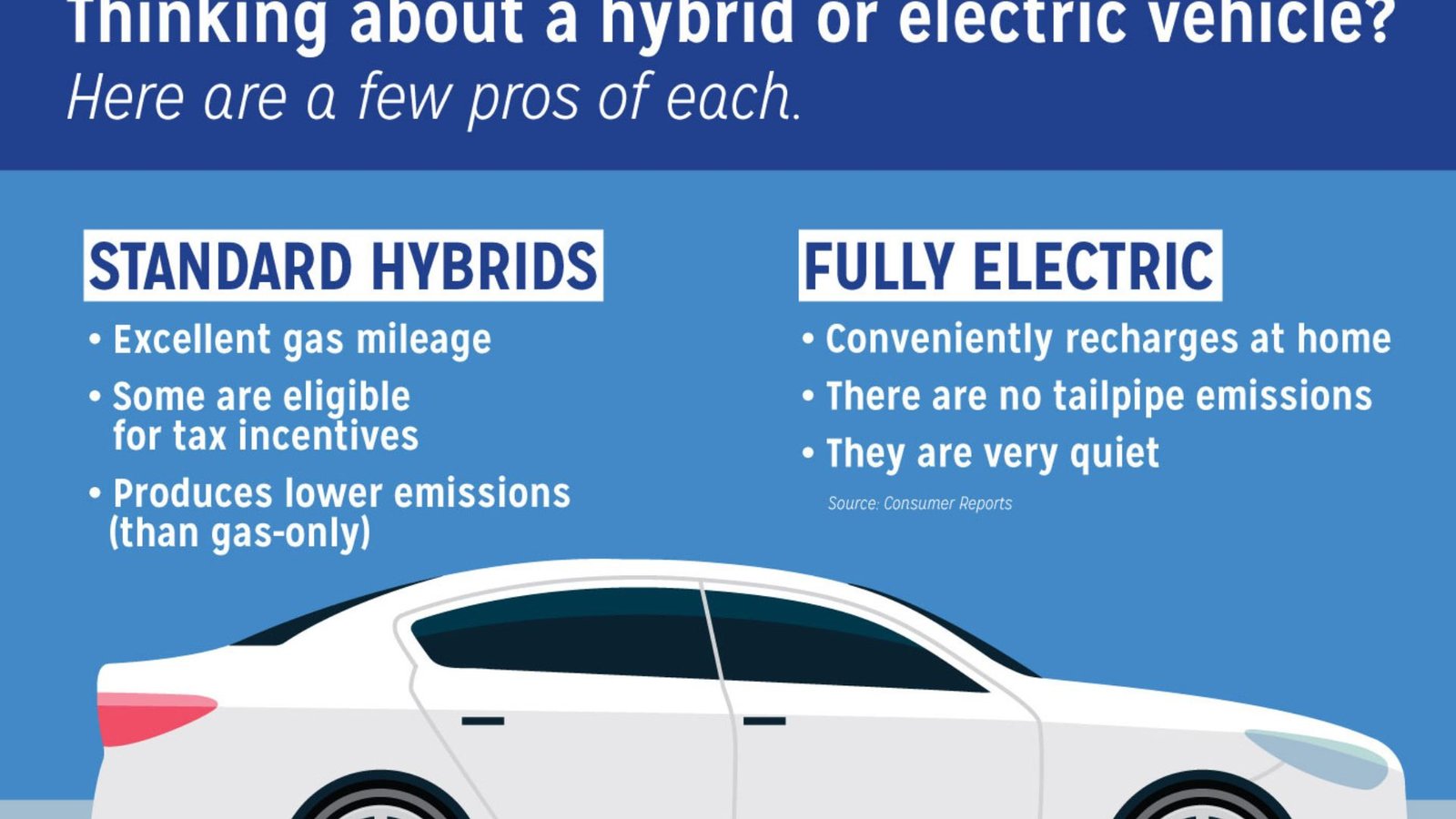Comparing Electric Vehicles to Hybrids
As the automotive industry evolves, electric vehicles (EVs) and hybrid vehicles are becoming increasingly popular options for environmentally-conscious drivers. While both types of vehicles aim to reduce emissions and improve fuel efficiency, they have distinct differences. In this comparison, we’ll explore how electric vehicles and hybrids stack up against each other in terms of efficiency, cost, and environmental impact.

Understanding Electric Vehicles (EVs)
Electric vehicles are powered entirely by electricity stored in batteries. They have no internal combustion engine and produce zero tailpipe emissions.
Zero Emissions
One of the main advantages of electric vehicles is their zero tailpipe emissions. EVs help reduce air pollution and greenhouse gas emissions, making them an excellent choice for environmentally conscious drivers. By using electricity rather than gasoline, they contribute to a cleaner environment.
Limited Range and Charging
While EVs offer significant environmental benefits, they also come with some limitations. The driving range of an electric vehicle depends on the battery size and efficiency. Although many modern EVs now offer a range suitable for most daily driving needs, longer trips may require careful planning. Additionally, charging infrastructure is still expanding, which can impact convenience, especially in areas with fewer charging stations.
Higher Initial Cost
Electric vehicles typically have a higher upfront cost compared to traditional gasoline-powered cars. However, this cost can be offset over time through lower operating expenses, such as reduced fuel and maintenance costs. Many governments also offer incentives and rebates to help reduce the initial purchase price of EVs.
Exploring Hybrid Vehicles
Hybrid vehicles combine an internal combustion engine with an electric motor, which can work together or independently to power the car.
Improved Fuel Efficiency
Hybrids offer better fuel efficiency compared to traditional gasoline vehicles. The combination of an electric motor and a gasoline engine allows hybrids to use less fuel and produce fewer emissions. This is particularly beneficial in stop-and-go traffic, where the electric motor can handle low-speed driving while the gasoline engine kicks in at higher speeds.
Lower Emissions
While hybrid vehicles do produce some emissions, they are significantly lower than those of conventional vehicles. Hybrids help reduce overall pollution and can be a good option for drivers who want to lower their environmental impact without fully committing to an electric vehicle.
Lower Initial Cost
Hybrids generally have a lower initial purchase price compared to electric vehicles. They also benefit from the availability of a wide range of models and price points, making them more accessible to a broader audience. However, hybrids still have some ongoing costs related to fuel and maintenance.
Key Differences Between EVs and Hybrids
To understand how electric vehicles and hybrids compare, let’s look at some key differences:
Environmental Impact
Electric vehicles have a clear advantage in terms of environmental impact. They produce zero tailpipe emissions, making them a better choice for reducing air pollution and combating climate change. Hybrids, while more eco-friendly than traditional vehicles, still rely on gasoline and produce some emissions.
Driving Range and Refueling
Electric vehicles are limited by their battery range, though advancements are improving this aspect. Charging can also take longer than refueling a gasoline or hybrid vehicle. In contrast, hybrids offer the convenience of a gasoline engine for extended range, reducing concerns about running out of power and eliminating the need for frequent charging stops.
Maintenance and Running Costs
Electric vehicles generally have lower maintenance costs due to fewer moving parts and no need for oil changes. However, battery replacement can be a significant expense. Hybrids require maintenance on both the electric and gasoline components, which can lead to higher costs over time. However, hybrids still benefit from improved fuel efficiency, which helps lower overall running costs.
Driving Experience
Electric vehicles offer a smooth and quiet driving experience, thanks to the lack of an internal combustion engine. They also provide instant torque and responsive acceleration. Hybrids, while generally offering a quieter ride than traditional vehicles, still have an internal combustion engine that may produce noise and vibrations.
Choosing the Right Vehicle for You
When deciding between an electric vehicle and a hybrid, consider your driving habits, budget, and environmental goals.
Daily Commutes vs. Long Trips
If your daily driving needs are within the range of an electric vehicle and you have access to convenient charging, an EV might be a great choice. For those who frequently drive long distances or lack easy access to charging stations, a hybrid could offer the best of both worlds with improved fuel efficiency and the convenience of gasoline refueling.
Budget Considerations
While electric vehicles have higher initial costs, they may offer savings over time through lower operating expenses. Hybrids typically have a lower upfront cost but still involve ongoing fuel and maintenance costs. Evaluate your budget and consider potential savings from reduced fuel expenses when making your decision.
Environmental Goals
If your primary goal is to minimize environmental impact, an electric vehicle is the more sustainable option due to its zero emissions. Hybrids are a good intermediate choice for those who want to reduce their carbon footprint but are not ready to commit to a fully electric vehicle.
Conclusion
In conclusion, both electric vehicles and hybrid vehicles offer unique benefits and challenges. Electric vehicles excel in zero emissions and lower maintenance costs, while hybrids provide better fuel efficiency and flexibility for longer trips. By considering your driving needs, budget, and environmental goals, you can make an informed decision on which type of vehicle best suits your lifestyle. As technology continues to advance, both options will likely offer even more benefits, making sustainable transportation more accessible to everyone.

